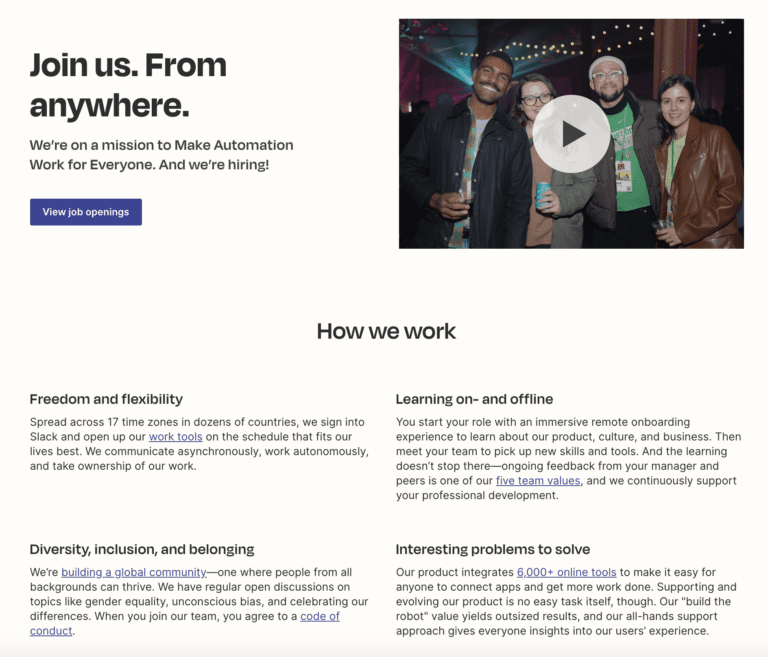8 Important Tips to Hire the Best Remote Workers

People a few decades ago could only dream of working remotely. Now, remote work is a reality for many businesses.
There are several benefits to a digital workplace, like expanding markets, lower costs, and diverse skills that help a company thrive.
And you can also recruit a broader talent pool for your company, especially when you allow work from anywhere.
Finding and hiring workers no matter where they live is convenient, but it can have challenges if you aren’t well prepared. Here are the top hiring tips to find the best remote workers and build a successful remote-first company.
1. Create Detailed Remote Job Descriptions
A complete job description is essential before hiring and publishing ads online. Most remote workers review job listings very closely to decide whether they should apply.
Provide the right details, starting with the exact job title, if there are any location requirements, and general hard and soft skills for each role.
Other job requirements to include are as follows:
- Technical requirements: Applicants must meet certain technical specifications to conduct their work online. About 36% of remote workers experienced slower internet connection at home than at the office. Avoid those problems by considering workers with strong connections and advanced computer and communication gear.
- Program requirements: Your company may use a communication tool or software application to produce quality work. Highlight these in your job descriptions to inform candidates about the software they must know, learn, or can expect. Think tools like Zoom, Slack, etc.
- Experience level: Are you hiring for an entry-level role or someone with more working experience? Do you want to prioritize candidates who have worked from home before? Setting expectations about an applicant’s level of expertise filters out remote workers who are a good fit for your company.
- Job flexibility: Set and specify the work hours you require from your remote team. Hiring someone from another country can be exciting, but you must consider the time difference. It will likely affect interviews, meetings and operations.
- Work benefits: Employers can arrange benefits to entice remote workers into applying. For instance, create a work from home stipend for their base salary. This allowance can cover their internet bill and workspace tools.
New to listing remote jobs? Follow our Remote Job Listing Template to set yourself up for success as you begin hiring remote workers.
2. Recruit Through the Right Sources
Beyond your own company career page, getting the word out about open remote jobs is essential. The good news is that top talent are looking for flexible work opportunities, so you should have no shortage of applicants.
However, if your company isn’t as well known or established, you need to amp up your discoverability.
Add your company’s remote jobs to places remote workers are paying attention to. Here’s a few places to keep in mind:
- Remote job boards. There are quite a few out there now but ones like AI Jobs, We Work Remotely, and RemoteOk are great places to start. Often you can post some free jobs for limited visibility or upgrade for a fee to get maximum job exposure.
- Join relevant communities. There are also online communities and groups dedicated to remote work. But you can also join specific niche communities as well. Say you are hiring for a Director of Marketing, joining relevant marketing communities can be great places to share those kinds of jobs.
- Access talent pools of candidates looking for work. There are thousands of talented people around the world looking for remote and hybrid work. This can be a great way to build your recruitment pipeline and reach out to matching candidates that are look for or open to new remote jobs.
These are places that remote workers are heavily invested in and monitor. It’s a great way to build further attention to open remote jobs.
3. Have a Strong Online Presence
Remote workers will likely research your company if they’re considering applying for an open position. Therefore, building a solid online brand they can refer to is crucial.
There are a few key areas here that will help you hire the best remote workers.
- Build a strong LinkedIn company page. There is an option to have a “My Company” option where you can showcase your culture, jobs, people, and remote benefits.
- As a recruiter or talent leader, you should focus on building your personal brand on LinkedIn. Building your network, posting about the company remote culture, and sharing jobs will help you attract talent to your open remote jobs.
- Invest in your company’s “About” page on the website. This is where remote workers can read up on your business, the leaders, and learn more about why this is a place they should be applying to.
If you are new to LinkedIn or want to tighten up your profile, consider downloading the LinkedIn Personal Brand Checklist. It’s completely free and filled with great tips.
4. Emphasize Remote culture On Career Pages
Sometimes, the remote job listing itself just isn’t enough to get remote workers excited. It’s why it’s critical to have a strong “Careers” page on the company website.
The “About” page is also a great place too, but your careers page is where you can really shine the light on culture, remote work policies, what it’s like to work there, and more.
When you make it super engaging and transparent, you’ll quickly attract the best remote workers around the world.
Some things you can do on your company careers page:
- Consider making a short recruitment clip. Discuss your company’s work culture and what your ideal candidate looks like. Even better, get some clips of remote employees talking about their work and the job they do.
- Putting human faces and voices at the core career page makes you stand out more than the competition. Many applicants are used to reading job ads, so having a person to watch and connect with can influence a quality candidate to fill out an application.
- Details about the culture, benefits, perks, and how your company operates remotely or handles hybrid situations. Can clear up processes or your company approach to communication with virtual employees.
Need some inspiration? Companies like Zapier, Doist, and Hotjar are some good examples to follow. Seriously, Zapier's is so good:

5. Assess the Capabilities to Work Remotely
Most recruiters must deal with spam or random applications. Certain candidates mass-send their resumes to different people without reading a job post.
Once your virtual screening interview begins, you’ll want to interview the candidate like you normally would for the role.
Ask them all the questions related to the job but also ask about their abilities as a remote worker. You want to first be sure that each person has the necessary skills for the role but also can handle the autonomy of working remotely.
Some of the questions to ask potential remote hires include:
- Why do you want to work remotely?
- How do you work with others in virtual workplaces?
- What challenges do you have while working remotely?
- How do you prefer to communicate with teammates?
- How do you ask for help when you need it?
- If you’ve worked remotely before, what were some challenges you had to overcome?
Note: Even Though a candidate might not have worked remotely before, don’t assume they won’t be a good fit for the role you are hiring for currently. Assess their communication skills, professionalism on the video chat, and answers to questions about remote work.
6. Define Your Ideal Criteria for Remote Workers
As you view various applications and reply, you must form criteria for your remote workers. Many of these candidates may meet your terms of a viable candidate, but there are other attributes to watch out for.
Ask yourself what specific assets you prioritize from a remote employee before moving them to the next steps of the hiring process.
Here are some examples to include in your criteria:
- Tech savviness: A remote worker will have limited office tech support to assist or teach them skills throughout the workday. Look for someone who understands your technical requirements and knows the necessary equipment. In an interview, ask about the candidate’s proficiency in Microsoft suite, typing and cybersecurity. Younger candidates are likely to have learned some of these skills in school, while others may have learned through past work experience.
- Communication skills: Employees working from home need to understand proper online engagement. It’s easy to get mixed messages when talking online, so candidates must demonstrate superior communication skills.
- Independent problem-solving: A remote worker should be an independent problem-solver. This trait is essential if there is little hourly overlap working with team members or employers.
- Self-motivation: Remote work can be lonely for some individuals. Hire someone positive and self-motivated. Will they guide themselves without being told what to do all the time?
- Proactive vs. reactive: The best remote workers are those who are good about being proactive and won’t wait around. They get ahead and take action.
- Strong integrity: Teleworkers may slack off when hired. The best remote workers have a strong work ethic and a solid sense of integrity.
7. Nail Down Your Strategy for Remote Interviews
Are you considering interviewing a candidate through a phone call or chat?
While it’s fine for an initial check-in, take time for a Zoom video call instead (Or whatever your preferred video chat tool is currently).
An interview of this format can give you a better understanding of a candidate’s personality. And hopefully, build a stronger rapport with them as they potentially move further along the interview process.
Plus, you can treat the virtual interview as a chance to see whether they have the suitable equipment, reliable internet, and decent work environment. Bring it up as a point in the conversation and let them explain how their setup currently functions.
Ultimately, ensure you have an agenda as well with your virtual interviews. Think about communication questions, sharing how your team works virtually, and have your specific questions ready ahead of time.
8. Expand Your Talent Pool And Hire Globally
While your company might have limitations of where they can hire remotely, think about working with your leaders to expand globally.
A “work from anywhere” policy will not only attract way more applicants, but you are diversifying your talent pool.
This can give your company a competitive advantage, plus ensures you are bringing people into the company with unique skills and experiences.
This only works with a “top down” approach, meaning the leaders fully believe in expanding remote work to other locations beyond where the company might be based.
Previously, this could be challenging with various tax laws, currency exchange, visas or work permits, etc. But it’s easier than ever with HR tools like Deel, Remofirst, and Remote that can handle all the complexities.
How is Hiring Remote Employees Different?
Your hiring process can’t be the exact same if you were hiring fully in the office. Remote work creates different areas to evaluate to ensure the candidate is the right fit.
In order to hire the best employees, you’re going to be focusing more on things like how they communicate, technological skills, experiences taking the lead or initiative in past work, and how they stay motivated in autonomous environments.
You certainly might look for some of that for in-person work, but it’s incredibly vital when interviewing for remote positions. It can make all the difference in finding a great remote hire.
Find the Best Remote Workers
The right remote team can make or break your business. And recruitment can be a tricky effort, especially when hiring remote workers.
But if you follow the tips above, you’ll find your business might become the next unicorn with a completely distributed workforce.








